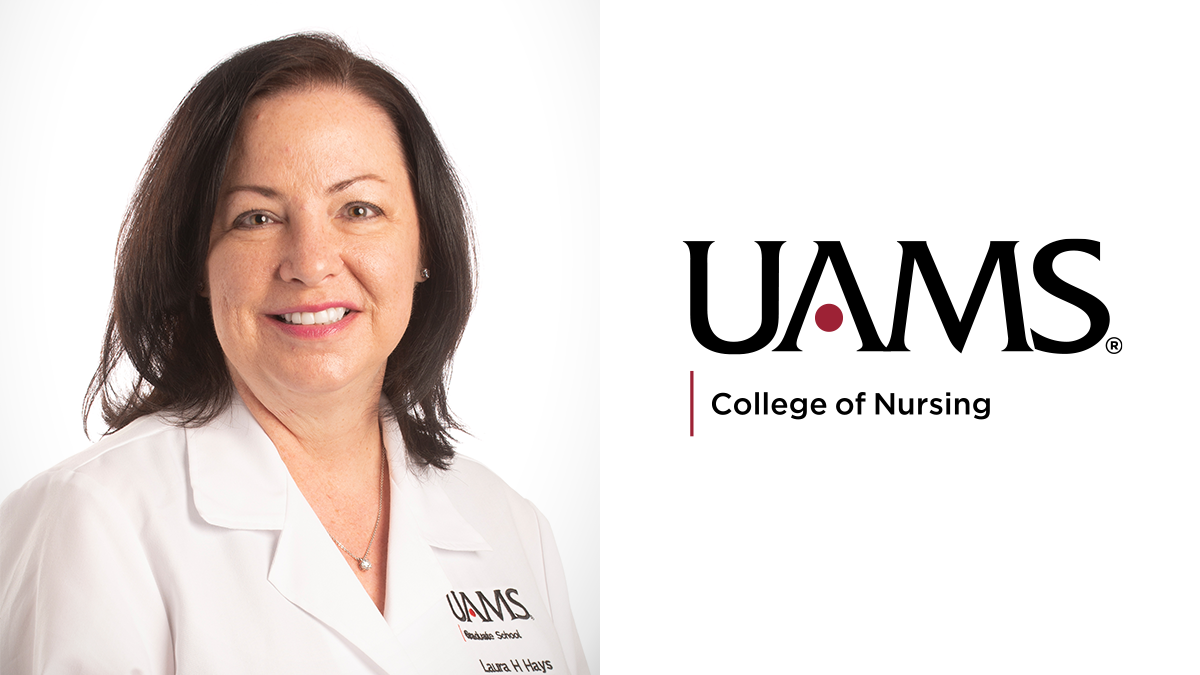View Larger Image

Laura Hays, Ph.D., APRN, is an associate professor in the UAMS College of Nursing.
UAMS College of Nursing Professor Receives Grant to Enhance Arkansas’ Newborn Screening Program
| Laura Hays, Ph.D., APRN, associate professor in the University of Arkansas for Medical Sciences (UAMS) College of Nursing, has received a four-year, $1.4 million federal grant to expand and enhance the Arkansas Department of Health’s Newborn Screening Program.
The new project, known as the Arkansas Coordinated NBS Expansion through Collaboration and Technology (AR CNECT) Program, will improve the efficacy of the state’s newborn screening efforts by creating a comprehensive educational program for health providers and families. Hays and her team also plan to raise public awareness of the Newborn Screening Program and its importance for children born with genetic disorders.
The AR CNECT Program will also expand the state’s outreach to families of infants found to have genetic conditions, ensuring that they have access to educational and supportive services. Hays said the program will work with UAMS Regional Campuses, the UAMS Institute for Digital Health & Innovation and other partners to reach underserved communities through digital health services.
Among those who will benefit are the families of infants identified as having hemoglobinopathy traits such as sickle cell. Each year, more than 1,000 newborns in Arkansas carry a hemoglobinopathy trait, which affects the hemoglobin in red blood cells and can be passed to future generations, Hays said.
“In the past, families received notification and education about these conditions through the mail,” she said. “Our program will allow for the addition of a full-time, licensed social worker to consult with the families and connect them to available services.”
The grant was awarded by the Health Resources and Services Administration (HRSA) of the U.S. Department of Health and Human Services.
Hays has served as a clinical consultant for the Newborn Screening Program for the past nine years. The program helps ensure that newborns are tested for dozens of medical conditions that, if left untreated, can affect their physical and mental development or threaten their lives.
“By empowering families and connecting them to resources in their communities, our goal is to reduce health disparities and ensure that all Arkansans can have a proactive role in their newborns’ health care,” she said.
UAMS is the state’s only health sciences university, with colleges of Medicine, Nursing, Pharmacy, Health Professions and Public Health; a graduate school; a hospital; a main campus in Little Rock; a Northwest Arkansas regional campus in Fayetteville; a statewide network of regional campuses; and eight institutes: the Winthrop P. Rockefeller Cancer Institute, Jackson T. Stephens Spine & Neurosciences Institute, Harvey & Bernice Jones Eye Institute, Psychiatric Research Institute, Donald W. Reynolds Institute on Aging, Translational Research Institute, Institute for Digital Health & Innovation and the Institute for Community Health Innovation. UAMS includes UAMS Health, a statewide health system that encompasses all of UAMS’ clinical enterprise. UAMS is the only adult Level 1 trauma center in the state. UAMS has 3,485 students, 915 medical residents and fellows, and seven dental residents. It is the state’s largest public employer with more than 11,000 employees, including 1,200 physicians who provide care to patients at UAMS, its regional campuses, Arkansas Children’s, the VA Medical Center and Baptist Health. Visit www.uams.edu or uamshealth.com. Find us on Facebook, X (formerly Twitter), YouTube or Instagram.###